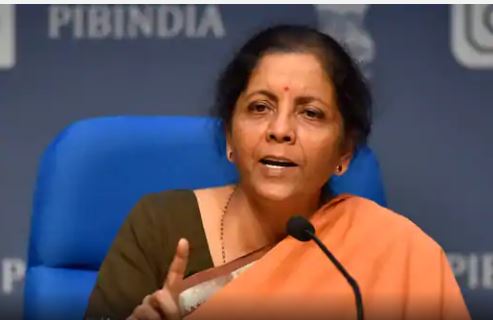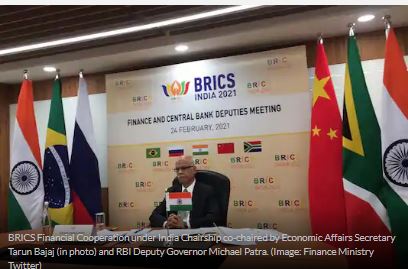Meet Finance Minister Nirmala Sitharaman’s team that will navigate often competing, multiple demands from various sectors, citizens, and stakeholders to provide a probable balm in these Covid times.
Sanjhi Soch Beauro –In less than a week, the Narendra Modi government will present perhaps its most important budget as the Indian economy recovers from an unprecedented global pandemic. Like the rest of the world, Covid-19 flatlined the economy, with the first quarter witnessing the steepest contraction in independent India’s history. For the full year 2020-21, GDP is likely to witness the first contraction in four decades.
Meet Finance Minister Nirmala Sitharaman’s team that will navigate often competing, multiple demands from various sectors, citizens, and stakeholders to provide a probable balm in these Covid times
By convention, the senior-most of the five secretaries in the Ministry of Finance is designated as finance secretary. Revenue secretary Ajay Bhushan Pandey currently holds that designation. A 1984 batch officer from the Maharashtra cadre, Pandey has also served as the CEO of Unique Identification Authority of India and is widely seen as one of the most powerful bureaucrats in the central government.
As head of the Revenue Department, Bhushan’s main role will be to set realistic tax targets, even as the economy begins its slow climb to pre-pandemic levels of 2019-20. In that year as well, there was a net tax revenue shortfall of Rs 1.45 lakh crore. The direct and indirect tax departments have stepped up efforts to widen the net this year and go after evaders and defaulters, and corporate tax and GST have shown encouraging signs in the past few months. However, this year is expected to be a washout. Pandey, who retires in end-February, will have to set targets in a way that the next year isn’t so.
A PhD in economics, expenditure secretary Somanathan is a 1987-batch officer from the Tamil Nadu cadre. He has worked in the Prime Minister’s Office (PMO) from April 2015 to August 2017, and is known to have the ears of Modi. Most of the suggestions from the PMO on the budget are likely routed through Somanathan and economic affairs secretary Tarun Bajaj.
Somanathan is a popular bureaucrat among colleagues, but his role isn’t. As expenditure secretary, he has enforced expenditure cuts in a number of departments, except the ones directly involved in battling the Covid-19 pandemic, even as his department has had to find the money for the stimulus announcements made by Sitharaman. The upcoming budget will definitively be the biggest on record, especially in terms of capital expenditure, and it will be Somanathan’s job to figure out where will the money be spent.
TARUN BAJAJ
The economic affairs secretary is another PMO ‘alumni’ having worked there for five years before moving to North Block in April 2020, a month into the lockdown. He was instrumental in helping shape the three ‘Aatmanirbhar Bharat’ sets of relief measures.
The Budget Division, which puts together all inputs and prepares the budget, reports to him and it is likely that Bajaj will draft Sitharaman’s budget speech (his predecessor Atanu Chakraborty drafted the 2020-21 speech, while most of Arun Jaitley’s speeches were drafted by former CEA Arvind Subramanian). Bajaj is a 1988-batch officer from the Haryana cadre.
TUHIN KANTA PANDEY
fter repeated failed attempts, including because of Covid-19 this year, the Centre hopes that its ambitious privatisation plan will finally get off the mark in 2021-22. The responsibility of carrying out these deals and ensuring their fruition falls upon Tuhin Pandey, the secretary of Department of Investment and Public Asset Management. Pandey is a 1987-batch officer from the Punjab cadre.
For 2020-21, DIPAM was given its highest target of Rs 2.1 lakh crore. Because of the prevailing global economic conditions, it may just achieve a fraction of that. Things look much better for next year, when Pandey’s priorities will be the privatisation of Bharat Petroleum, Concor, Shipping Corp and Air India, as well as the expected blockbuster initial public offering of LIC Ltd.
DEBASHISH PANDA
A media-shy bureaucrat from the 1987-batch Uttar Pradesh cadre, Panda heads the Department of Financial Services. All the financial sector-related announcements expected in the budget are his responsibility, including any further plans of recapitalisation.
The banks have weathered the pandemic better than many other sectors. However, there are concerns that loss of economic activity and jobs could lead to further defaults, and that, coupled with any waiver of interest that might occur, will affect their balance sheets. Additionally, the already precarious NBFCs may be impacted further. Panda will have to work closely with the RBI to ensure the stability of the financial system.
KRISHNAMURTHY SUBRAMANIAN
The chief economic advisor is a protege of Raghuram Rajan. An alumnus of IIT, IIM as well as University of Chicago Booth School of Business, his inputs and advice will be crucial in the budget making process. Before taking up his current role, he was a professor at the Indian School of Business, Hyderabad.
His bigger role, however, will be in drafting the Economic Survey 2020-21, which can be seen as a precursor to the budget. The survey’s views on the impact of Covid-19 on the Indian economy, on jobs, activity, various sectors, small businesses, households, education, and healthcare will be much awaited, as he has access to more government data than independent agencies do.












